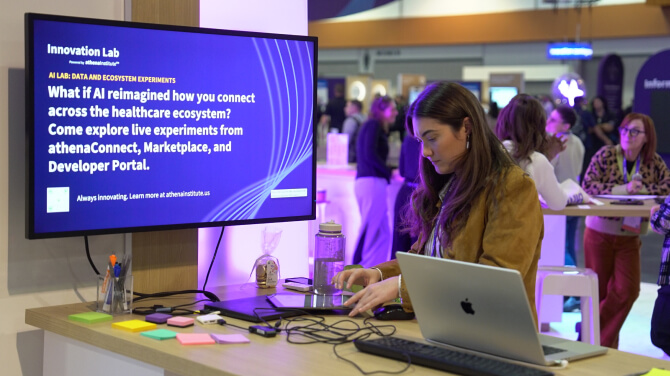Too Many Systems, Too Little Insight: How Coastal Health Found a Smarter Way Forward
Coastal Health Specialty Care
Jacksonville, Florida
Live on athenaOne® since 2022
Coastal Health Specialty Care is a multi-specialty healthcare organization dedicated to providing exceptional care to patients across a wide range of medical disciplines.
J.D. Wilson knew the challenge his organization faced. As Vice President of Information Technology at Coastal Health Specialty Care in Northeast Florida, he was navigating a tangle of disconnected systems that made insight and coordination nearly impossible.
The organization’s large, multi-specialty structure relied on a patchwork of platforms — each medical specialty with its own EHR, each function with its own workflows. “It was a very broken process,” Wilson recalled. “A lot of manual effort and room for error, which added expense and added overhead.”
Switching to a new EHR wasn’t a choice. It was a necessary move.
What Wilson didn’t expect was how much more Coastal Health would gain by implementing athenahealth’s integrated, cloud-based platform. “We came from a very broken set of systems in years past, prior to going on to athenahealth, and having even the thought of getting that data was impossible.”
A streamlined, supported transition through complex data migrations
Before adopting athenaOne, Coastal Health was operating across multiple siloed systems — up to eight data sets across four different platforms. Each specialty’s unique needs further complicated things.
“Processes are completely different for an ortho practice than they are for a primary care, so we have to make sure that we're harvesting data from both of those visits that can be used against each other,” Wilson said. But in a disconnected environment, that level of insight was nearly out of reach. “We had to get a little creative,” Wilson mentioned of their workarounds before the transition.
What could have been a complicated migration turned into a well-supported, collaborative journey. “We knew we were a little bit of a special case, because we came to the table with so many broken systems,” Wilson said. athenahealth didn’t just provide software — they assigned expert teams, hands-on support, and clear pathways through complexity.
Ultimately, the transition was much easier than expected. “I think I owe athenahealth a huge thank you on that,” he said. “The athenaOne team was incredible at assigning the right resources and making sure we had the right hands to hold along that process.”
New Visibility. New Potential.
With athenaOne in place, Coastal Health now has a single source of truth — enabling standardization, visibility, and scalable improvement.
“We were able to solve some problems that we knew we had, and we were able to take that and build new processes. Standardization into one system was really the crux behind that.”
We were able to solve some problems that we knew we had, and we were able to take that and build new processes.
J.D. Wilson
The operational transformation was about more than data migration. It was about unlocking what wasn’t possible before -- data integration and insights that made it both easier for physicians to provide care and for Wilson's operations staff to analyze operational efficiency.
“We create dashboards based on specialties and needs, whether it's quality-based or whether it's compliance-based,” Wilson said. This kind of top-line insight at-a-glance wasn’t possible when Wilson was manually aggregating data from various sources and trying to compare it. Now, Coastal Health can access and report outreport data without hours of manual work pulling it together.
The transition to athenaOne went beyond overhauling Coastal Health's digital infrastructure. Clinicians and staff now have new opportunities to optimize their work. “Burnout is a real thing, and you have to avoid that,” Wilson said. “I think athenahealth does a great job at preventing that from being a problem with our staff and providers.” He said that instead of calling to complain about challenges they’re facing using the software, they’re calling him to say, “Hey, this is really cool. What else can we do?”
As Wilson points out, clinicians often have a personal preference for their style of documentation, so it’s important that a system can adapt to different approaches. According to him, this is another area where athenaOne excels: “With athenahealth, we can fit our clinicians to a solution that they’re used to or more comfortable with.”
As Coastal Health and athenaOne both continue to evolve, Wilson is excited about the future. The integration of AI tools, such as athenahealth’s Ambient Notes technology, has the potential to further enhance both the patient and clinician experience. “We are really excited about the new Ambient that's being released through athenahealth,” he said.
A shared vision of success
When asked how Coastal Health measures success, Wilson’s response was immediate: “For us, success is helping the patient.” At Coastal Health, they recognize that healthcare is personal. “I have several family members that are patients spread across our offices.” Wilson shared. “Same with a lot of our staff. We care enough and we trust our own staff enough to send our families there.”
This frame makes their goal even more critical: to empower clinicians and staff to deliver a healthcare experience that makes each patient feel valued and cared for. For Wilson and fellow leaders at Coastal Health, athenaOne empowers them to better understand and improve their operational efficiency to deliver on that mission. For clinicians, Wilson believes athenaOne “helps them truly give the patient care that they deserve” by surfacing the right information at the point of care.
As he reflects on the changes, Wilson's pride is palpable. “I think athenaOne as a whole, the software is incredible, but the mindset and the partnership of athenahealth is what helps me the most."
Reach out today to learn how a partnership with athenahealth could serve your organization.
More resources
Empower your practice
Coastal Health participates in athenahealth’s Client Advocacy Program. To learn more about the program, please visit athenahealth.com/client-advocate-hub. Coastal Health was not compensated for participating in this content.
These results reflect the experience of one particular practice and are not necessarily what every athenahealth client should expect.







